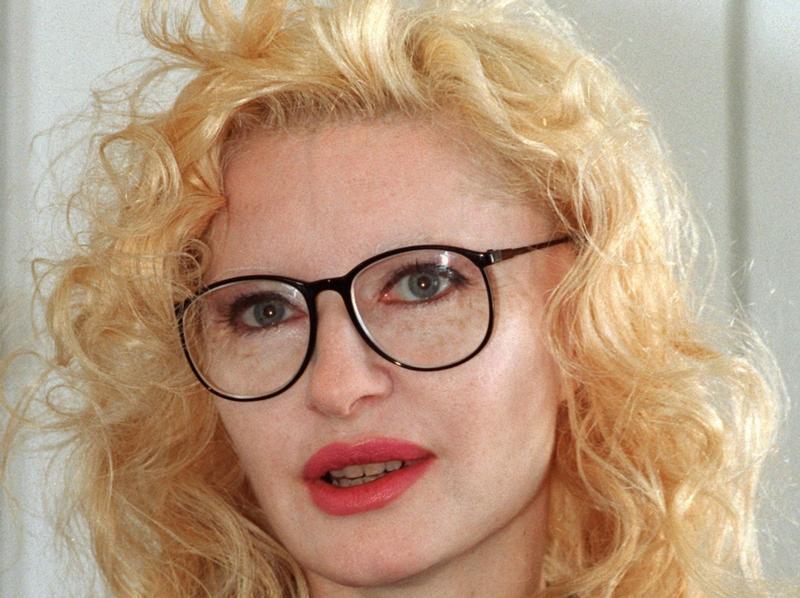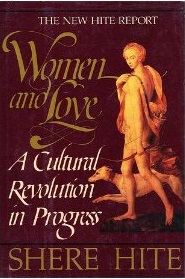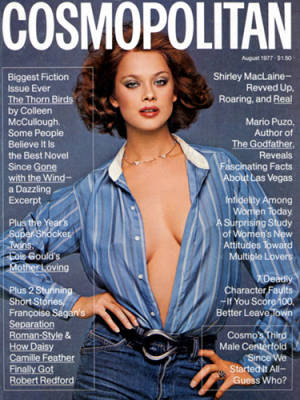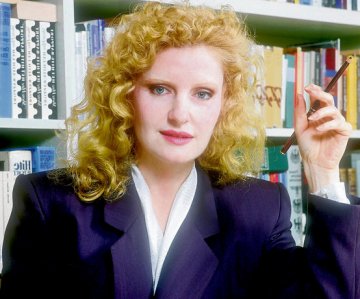theartsdesk Q&A: Sex researcher Shere Hite | reviews, news & interviews
theartsdesk Q&A: Sex researcher Shere Hite
theartsdesk Q&A: Sex researcher Shere Hite
As Channel 4 launches its sex season, we publish an interview with the author of The Hite Report into Female Sexuality

This week Channel 4 embarks on a season of programmes about sex. Real sex, it claims, in real British bedrooms. A new series called Masters of Sex dramatises the story of William Masters and Virginia Johnson, who from 1957 pioneered research into sexual response. And then there is Sex Box, in which couples will perform the eponymous activity in the eponymous container and then come out and discuss it in front of Mariella Frostrup and a live audience.
To hyperbolise only a little, Shere Hite is generally credited with the discovery of the clitoris. The Hite Report: A Nationwide Study of Female Sexuality, published in 1976, pooled the findings of a 100-question survey distributed to 3,500 American women. It was a big book that took six years to collate, but the long and the short of its message was that, contrary to the findings of Freud and Kinsey, women achieve orgasm more easily through clitoral stimulation than coitus. It was a landmark publication, nominated by The Times as one of the 100 key books of the 20th century. It has sold over 50 million copies worldwide. Playboy, for whom Hite had posed naked in the early 1970s to pay her way through college, called it "the Hate Report"
I met Hite on the occasion of the publication of her autobiography The Hite Report on Shere Hite. The book told the story of a life full of upheavals. She was born in Missouri in 1942 and, after her parents separated, brought up by her grandparents until they too separated when she was shipped at 14 to an aunt in Florida. After graduating from Columbia, she stayed on in Manhattan and led the sisterhood from the frontline. After her researches in female sexuality, The Hite Report on Men and Male Sexuality followed in 1981. She left America after the reaction to her book Women and Love: A Cultural Revolution in Progress (1987). The media's splenetic response could be pinned down to a brief footnote detailing the number of American wives who admitted to having had an adulterous relationship. She has lived in Europe ever since, and took German citizenship in 1995.
Next year Arcadia Books reissues The Hite Report on the Family and The Hite Report on Male Sexuality. As Channel 4 wades into Hite territory, it seems an appropriate moment to publish for the first time the text of that conversation with a woman of whom the clinical professor of psychiatry Anthony Clare once said, “Western society owes a debt to Shere Hite that will be well nigh impossible to repay.”
In the Fifties you were always supposed to say no and in the Sixties you were always supposed to say yes
JASPER REES: What drew you to writing about sexuality?
SHERE HITE: People constantly ask me. It’s hard for people to imagine how somebody who was in university started at a certain point to do that. The fact that the question comes up so often of course relates to how society relates to something we call sex. The fact that we see it as something so on a different planet from normal life or work life accounts for the surprise that people have that somebody would investigate that topic. Secondly, as a woman growing up with so many women around me, I think I saw so many different versions of womanhood that it made me have a lot of questions about women. Of course the women’s movement was a catalyst. The whole issue about sex for women - nice women don’t like sex, women are bad if they are sexy - those old clichés which we might laugh at today, still linger around. In my work I’ve tried to show there’s a split identity between what you might call regular life and then those leanings. There is for men too. It’s my thesis that women, to feel as powerful or good as they could, need to be able to feel like one person, not two, so that’s why in the first place I was studying female orgasms.
I started doing the questionnaire before I thought I would publish it. First I was doing a questionnaire that we would use as a weekend discussion point in the National Organisation for Women. It mushroomed. Most of the findings were a surprise. It was like going on a treasure hunt. But I was testing out the idea of when women had orgasm, because there was some debate going on at that time. The clitoris was something that hadn’t been talked about for maybe 100 years, they had forgotten the word, when Masters and Johnson talked about the clitoris.
 So your research was a quest to find the female orgasm?
So your research was a quest to find the female orgasm?
In part. It’s a little reductive but it sounds really good. Of course all the other issues were buzzing around, like the sexual revolution, which is different from feminism, as you know. The feminist group that I was in, and women in general according to my research, felt so frustrated by the whole idea that now they were just supposed to be sexy and, as they put it, spread their legs at the drop of a hat. It was like in the Fifties you were always supposed to say no and in the Sixties you were always supposed to say yes. Part of that was really important too. It was a quest for women to create their own definition of sexuality.
So the sexual revolution was not as much fun for women.
Most women believe, based on my data, that it is better to have it than not to have it. You don’t want to go back to the Fifties. But at the same time it’s been a revolution that was very pro-male, if you want to think that it’s pro-male to have a lot of penetration. If I had to put it in a nutshell, which no one ever asked me before believe it or not, I thought it would be a quest for women to define their own sexual identity.
Would you have liked to have grown up in a different decade?
Sometimes I think it might be fun to start up now and grow up with computers. My first three reports were without computers. It’s a different mentality altogether. I wouldn’t want to have grown up in an earlier time. I would have liked to have visited them. I think it was interesting to grow up in the States in the 1950s because I was in the first integrated high school, and so we had lots of experiences because of that. The Sixties anti-war movement was pretty interesting, because it was a turning point for the States - at least we thought so and I still think so now.
When did you first describe yourself as a feminist?
After getting involved with that group of women. It’s just a word that became a part of the lexicon at that point.
Could you have had a family and done all this?
I really wonder. I think one could have done the research but to do all the work that’s involved with publishing books in several countries, I doubt it. If I had a family that was very wealthy and paid for a nanny and helped me in that way… but without a lot of money behind you I do think it’s almost impossible.
 In 1987 why did you come in for such a hammering with your book Woman and Love?
In 1987 why did you come in for such a hammering with your book Woman and Love?
Of course as a woman I can tell you that there is not a day in one’s life when one doesn’t do this self-examination from head to toe, and worry that one has done something wrong 24 times in the last minute, so of course lots of ideas crossed my mind. But trying to really analyse what happened, there were quite a few analyses of the whole thing in the feminist press and they all seemed to have the same point of view. The general consensus was that under Reagan’s American feminism was really a no no. Pat Robertson and others including Reagan were saying that feminism was causing the decline of the family. Various people who wrote the articles said that they thought I was the most visible feminist at the moment. The statistic that was taken out of the book was just buried in a footnote, one of at least 200, the one about whether women had extramarital sex and how often. That was the one that I guess seemed to relate to the so-called decline of the family, which is a phrase I don’t even agree with. You could account for maybe one or two attacks because of the way I am, but a sustained attack by so many media came from a deeper source, and that source was the rising tide of back to basics, let’s get the feminists, and there’s one, she looks like a good target. I wrote about sex.
There must have been some male rage directed specifically at you.
A couple of male sex therapists would always say to me, “Don’t you realise, Shere, that they’re just angry with you because of your first book when you claimed that men didn’t know how to give women an orgasm and that women have been faking it all those years?” I don’t think there is any one thing. Some got angry for one reason and some got angry for another. They still avoid using the world clitoris in women’s magazines or in newspapers. That’s a word that is still considered a little bit outré. People are still terrified of the word.
Are they terrified of the word or the part of the body?
Both probably. In Hollywood movies too except once or twice you’ve not seen clitoral stimulation to orgasm. Sex is still depicted in porno videos and Hollywood movies as coitus. That’s what sex still is. There is mostly oral sex by women to men. There’s not too much going the other way. I try to keep track. Maybe they think it makes a better visual, I don’t know. Yes the ideas are now taken for granted everywhere with the exceptions that the word clitoris isn’t really accepted yet to the extent that I would think it should be if people were truly comfortable with all these subjects, and secondly since Hollywood films and porno videos still show women having orgasm during coitus, almost inevitably, then the culture still has a problem with these issues. But sex therapists have certainly accepted these ideas.
 Did your research run parallel with the message about sexual liberation for women espoused by Helen Gurley Brown and Cosmopolitan (August 1977 cover pictured right)?
Did your research run parallel with the message about sexual liberation for women espoused by Helen Gurley Brown and Cosmopolitan (August 1977 cover pictured right)?
I didn’t read Cosmo in the Seventies because we as feminists were too pure to read it, so I can’t really judge. I imagine that they didn’t write about it before I did. A long academic paper was written accusing me of being the one who started the trend of all these women’s magazines to have sex questionnaires in every issue and then went on to say how terrible I was. It’s not my fault what they did with it. Cosmo was the vehicle for explaining that it was OK to have sex and be single. Helen Gurley Brown became a figure of triviality for some reason but she felt that she did a great service to women, because she broke them out of this bond of the virginity thing in the Fifties. She took me out to lunch once. She said there was a man at the publishing house who asked her to write her book. "Didn’t someone ask you to write your book?" I said no. She said, “You mean you’re like the Lone Ranger?” I said, “I guess so.”
Did the fact that you were blonde and attractive and evidently took an interest in the way you looked in some way confuse your sisters?
I read some articles that said they found it confusing. How could I be so politically correct and right on and at the same time look so incorrect? It’s my right to dress the way I want but there is probably a better answer. It’s all about who are women? I remember when I published my first book I was having lots of talks with my friends about what I should wear. Some said, “You should wear something like a suit.” Others said, “You should wear a clinical outfit like a white jacket like Masters and Johnson.” Others said, “You should wear what you want.” On the other hand it was clear that I shouldn’t wear make-up and I shouldn’t shave my legs.
 With the first book I hadn’t any money at all so I was wearing whatever I had. I think I bought one dress which cost $140. I wore it everywhere, and that seemed to work pretty well. I remember there were reporters who did make fun of my clothing. With my second book I was determined that wouldn’t happen so I bought some of those power suits with the shoulder pads, and those were OK. But it was like putting on a costume. I started realising that I wasn’t dressing the way I wanted to, and there would be a big difference between how I would dress in private and how I would dress if I had to present a public issue. Then I started going through a stage where I would dress the way I wanted, then a stage where in a way I tried the most extreme versions of female appearance and dressing. So there are four or five different strands here and one is that I think femininity has lots of good qualities and shouldn’t be completely excluded from cultural choice. I like femininity.
With the first book I hadn’t any money at all so I was wearing whatever I had. I think I bought one dress which cost $140. I wore it everywhere, and that seemed to work pretty well. I remember there were reporters who did make fun of my clothing. With my second book I was determined that wouldn’t happen so I bought some of those power suits with the shoulder pads, and those were OK. But it was like putting on a costume. I started realising that I wasn’t dressing the way I wanted to, and there would be a big difference between how I would dress in private and how I would dress if I had to present a public issue. Then I started going through a stage where I would dress the way I wanted, then a stage where in a way I tried the most extreme versions of female appearance and dressing. So there are four or five different strands here and one is that I think femininity has lots of good qualities and shouldn’t be completely excluded from cultural choice. I like femininity.
What’s your stance on plastic surgery?
I think it’s OK. It was invented by a woman, by the way. No one seems to know this: Madame Claude.
You've asked many women about their sexual experiences. In your autobiography book you write about your own sexual experiences, including one when you are quite young.
You’re just learning. It takes a while to learn how to really enjoy sex. I was 15. I think that that’s not such a young age for a lot of kids.
How long did it take you to learn?
I think a lifetime. I always wanted to write about book how you learn to love. Loving is of course an art. It takes ages to even begin. If we were all experts we wouldn’t all have so many problems.
Explore topics
Share this article
The future of Arts Journalism
You can stop theartsdesk.com closing!
We urgently need financing to survive. Our fundraising drive has thus far raised £49,000 but we need to reach £100,000 or we will be forced to close. Please contribute here: https://gofund.me/c3f6033d
And if you can forward this information to anyone who might assist, we’d be grateful.

Subscribe to theartsdesk.com
Thank you for continuing to read our work on theartsdesk.com. For unlimited access to every article in its entirety, including our archive of more than 15,000 pieces, we're asking for £5 per month or £40 per year. We feel it's a very good deal, and hope you do too.
To take a subscription now simply click here.
And if you're looking for that extra gift for a friend or family member, why not treat them to a theartsdesk.com gift subscription?

Add comment